
32 minute read
Malinche.” David Ellison looks into the background of the


Advertisement
By David Ellison
Malinche (also known as Marina, Malintzin, Malinal…) remains one of the most enigmatic and controversial characters in Mexican history.
According to Texan historian T. R. Fehrenbach, “If there is one villainess in Mexican history, she is [Malinche]. She was to become the ethnic traitress supreme.”
Meanwhile, Colorado Professor Cordelia Candelaria called her a “prototypical Chicana feminist. La Malinche embodies those personal characteristics—such as intelligence, initiative, adaptability and leadership—which are most often associated with Mexican-American women unfettered by traditional restraints against activist public achievement.”
Born to a royal family, Malinche was sold into slavery as a young girl, perhaps by her own mother. She was eventually given as tribute to Hernán Cortés who, once he recognized her noble bearing and especially her mastery of multiple Native languages, made her his interpreter, mistress, and even adviser.
Malinche enabled Cortés to convince many subjugated tribes to join him in overthrowing their Aztec overlords. According to one apocryphal account, Cortés quipped afterward that, after God, Malinche was the main reason for his success. The fact that he named their child after his own father, Martín, was a huge, public testament of his love and respect for her.
Together, Cortés and Malinche founded a new Mestizo (mixed Spanish and Native) race.
Did Malinche thus betray her own race? She enabled Cortés to end Aztec tyranny and human sacrifice. Even Native accounts (recorded on codex drawings) depicted her in heroic fashion, sometimes even carrying a shield into battle. She could never have anticipated the horrific results of Cortéz’ ruthless conquest of Mexico—aided in no small part by Smallpox, which finally claimed Malinche, too, at the young age of about 25.
Perhaps journalist Farah Mohammed summarized Malinche best: “What all the stories of Malinche’s life—both damning and sympathetic—ultimately reveal is a particularly intelligent and resourceful woman, betrayed, enslaved, buffeted between two empires, somehow emerging as a historical giant in her own right.”
This is a selection from Ellison’s book-in-progress, Niños Héroes: The Fascinating Stories Behind Mexican Street Names. He retired a year ago after 36 years in education. He and his partner, Edgar, volunteer at Lucky Dog and SOS Chapala Dog Rescue.







By Jackie Kellum
Has your cat or dog lost their hips, and looks more like a butter-
ball? Then possibly your pet has become obese from “love over feeding”. Excess weight is easier to prevent than treat, so keeping a lifelong healthy weight will help keep your pet healthier and happier.
If there is not a specific medical condition causing obesity diagnosed by your Vet., the most common cause is an imbalance between food intake and its usage. The same as in humans, the pet is eating more than it can possibly ‘burn’. Obesity also becomes more common in old age because of the normal decrease in the pet’s ability to exercise. Unhealthy eating habits, such as high-calorie foods and frequent treats is a contributing factor.
There have been many studies done mostly with dogs, on the longterm effect of obesity of our pets. During my research, it has shown that both cats and dogs are both affected negatively by obesity. Both species have the increased potential to develop the same types of medical problems. One dog study showed dogs who are trim live longer (2 years on average) than their mildly overweight counterparts. The study also showed reduced risk of some diseases or developing them later in life. Some studies showed non-obese cats may also see similar benefits.
This is a short summary of medical conditions caused by pet obesity. (A) When having surgery or need for anesthesia, the obese pet is at higher risk for complications or death, and also are less heat tolerant, (B) Many pets require special care in selecting the correct dose for medications, (C) Obese pets who stop eating when ill, etc.. are at greater risk for developing a potentially life-threatening liver condition called Hepatic Lipidosis, (D) Overweight pets develop an increased risk for many types of cancer, heart disease, hypertension, torn ligaments, hormonal imbalances, (E) Obesity creates extra fat, which does not just sit there, it secretes hormones into the blood steam, that increases stress and inflammation in the body, making it more difficult to fight infectious diseases, (F) Overweight pets are almost five times more likely to develop lameness due to osteoarthritis, with faster degeneration of affected joints, (G) Obese cats are three times more likely to need veterinary care for non-allergic skin conditions, possibly because the cats cannot reach all parts of their body to properly groom themselves, and (H) Diabetes, is not only a risk factor, but can make the diabetes more difficult to control.
FYI: Unlike most other mammals, cats do not have the enzyme amylase secreted in their saliva, which helps digests carbohydrates. An ideal cat diet should contain low carbohydrates and high protein. [Read the pet food labels]. In general a diet that is rich in [identifiable] dietary protein and fiber, low in fat, are typically recommended, since dietary protein stimulates metabolism and energy expenditure, and creates the feeling of fullness. Weight loss should be gradual and consist of a healthy diet with sufficient exercise. Even reducing a weight loss of 6 - 8% in dogs showed reduced pain and requiring fewer medications. A weight reduction program should be discussed with your Vet.
Many pet owners believe that feeding their pet is a sign of love, which is the main reason for over-feeding. An animal that is constantly over-fed will recognize this human behavior, and will then increase their begging. The animal’s owner then thinks that the animal loves him in return, so this vicious cycle of “overfeeding” begins/ continues. The best way to show love for your pet is to feed them in a way ensuring a healthy and long life. Also give him more time, attention and nonfood rewards.
Jackie Kellum





Carol D. Bradley
Email: cdbradleymex@gmail.com Phone: 33-2506-7525
“The greatest obstacle to living is expectancy, which hangs upon tomorrow and loses today…The whole future lies in uncertainty: Live immediately.” Seneca
Our Lakeside community is reeling; still reeling, from the insidiousness of the Covid-19 virus. After months, almost a year, of sheltering in place, lockdowns, COVID-19 protocols, we are finally seeing a light at the end of our tunnel. The vaccine is coming. In the meanwhile, keep safe my friends. If you can; safely go out, enjoy your favourite restaurants, your favourite musicians. If you aren’t going out, all restaurants have pick-up and/or delivery. They need your support. I’ll bet you can get a serenade or two if you play your cards right.
The Lake Chapala Society hosts Open Circle every Sunday at 10AM, a popular community gathering in Ajijic, to enjoy a diverse range of presentations.
For more information and to make reservations, see their website: opencircleajijic.org.
In order to follow State of Jalisco safety precautions, attendance will be limited to 80 persons, reservations required, use of mask is mandatory and temperature checks on entry. During this period, we recommend bringing your own coffee or bottled water, and please remove containers upon departure. Open Circle video Consent. As a service to our audience and presenters, Open Circle will video-record presentations and upload them on the LCS YouTube channel.
Open Circle presentations for February 2021:
February 7: Your Life Is a Battlefield. Your Weapons: Power, Control, and Domination
Presented by Daniel Acuff
Dr. Acuff will explore how you and the important others in your life use power, control, and domination to win, get ahead, and avoid losing in the game of life. He will analyze each of the weapons that you and others utilize in this battle, and will show how you also apply your physical body along with intellectual, emotional, social, and ethical powers to gain control. You’ll be surprised to discover how these forces play out consciously and subconsciously in your everyday life.
Dr. Acuff’s Ph.D. is in philosophy, sociology and education. He has been a seminar leader, radio talk show host and marketing consultant for more than 40 major corporations. He is author of fifteen books including three philosophical/ spiritual works of fiction: God Lied–What’s Really Going on Here, The Mysteries of Quan, and Golf and the Zen Master.
February 14: The Great Pause (Postponed from January 3rd) Presented by John Stokdijk
John Stokdijk will share his thoughts about the coronavirus crisis as a spiritual experience. What insights can be gained? What lessons can be learned? How are we to live now? John will share some of his exciting new discoveries during this extremely disruptive pandemic. His presentation will be a continuation of the spiritual journey he shared at Open Circle in 2015, accessible by clicking here: Secular Spirituality. John and his wife Pat moved to Lakeside in 2012. Locally he is best known for launching the Ajijic Book Club in 2016. ABC has continued to meet and thrive utilizing Zoom. In addition to reading, John enjoys tending his garden and exercising on his treadmill. He and Pat have remained mostly in quarantine supported by local shopping and delivery services.
February 21: When Vulnerability Becomes Strength: From Care Giver to Receiver
Presented by Loretta Downs
How do we adjust when health challenges upend our independence? Whether parent, child, spouse, partner, friend or neighbor, we face vulnerabilities while adapting to role reversals from care giver to care receiver. Being vulnerable is never welcome yet receiving care provides opportunities for developing compassion, expressing love, achieving personal growth, and finding grace. Learn ways to welcome your vulnerability and surrender to “what is.”
Loretta Downs, MA, CSA has studied death and supported the dying since the AIDS crisis in 1985. Since then she has been a hospital, hospice, and nursing home volunteer and earned a Master’s Degree in Gerontology, specializing in Thanatology. She is Past-President of the Chicago End-of-Life Care Coalition, a Certified Senior Advisor, End-of-Life Care Practitioner, Advance Care Planning Facilitator, and Death Doula. She has given workshops, published articles, been quoted in articles and books, and is featured in a video about the importance of advance care planning. After ten winters as a snowbird, Loretta has returned to Lakeside as a permanent resident.
My sources in our Theatre groups, Lakeside Little Theatre and Bare Stage Theatre, our Music, Lake Chapala Community Orchestra and Live at the Met are disheartened they cannot bring you anything new and exciting during this time of such risk.
Many in-person events are growing and thriving online, like the Ajijic Writers Group, gathering a global audience (contact VictoriaASchmidt@gmail.com to register). Check your favourite Facebook pages for more current updates.
As I had lunch on the Ajijic plaza at Christmas time, I delighted in hearing Carols from a group of classical musicians. I wondered over. This is what I learned:
The International Institute started teaching strings the year they opened in 2011. The first classes were very small. In 2015, they formalized a program for a string orchestra. Instruments now include violin, viola and cello, though they have had string bass, piano, flute, clarinet, saxophone and percussion players join in the past.
Pre-pandemic, three concerts per year were performed with additional concerts for charity at assisted living homes, such as Ohana in San Juan Cosalá.
Rehearsals were for-credit music classes, and students rehearsed twice per week for 90 minutes per rehearsal during the school day. Students from 7th grade through 12th participated. The program grew from about 5 students in 2015 to about 40, pre-pandemic in 2019. In addition to the strings’ methods classes given during the school day, an afterschool orchestra rehearsed twice per week. The after-school orchestra was a “community” orchestra which included interested students, teachers, and general community members who liked to play string arrangements for fun. We play everything from Christmas music, to musicals, Disney soundtracks, basic arrangements of classical pieces (Canon in D, Beethoven’s 9th, etc).

John Stokdijk Loretta Downs
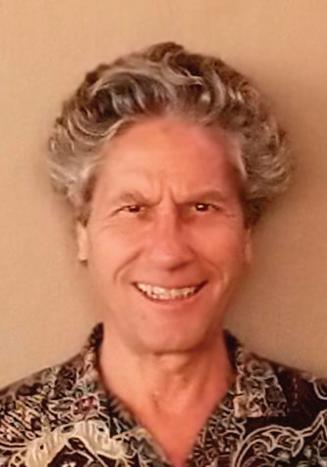
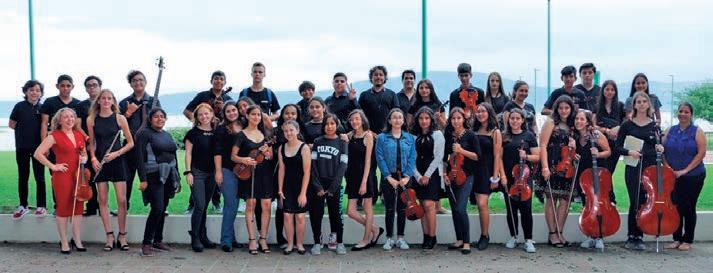
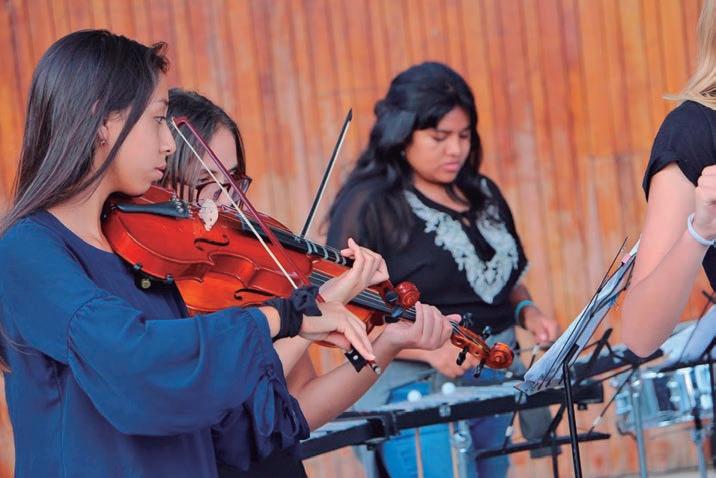



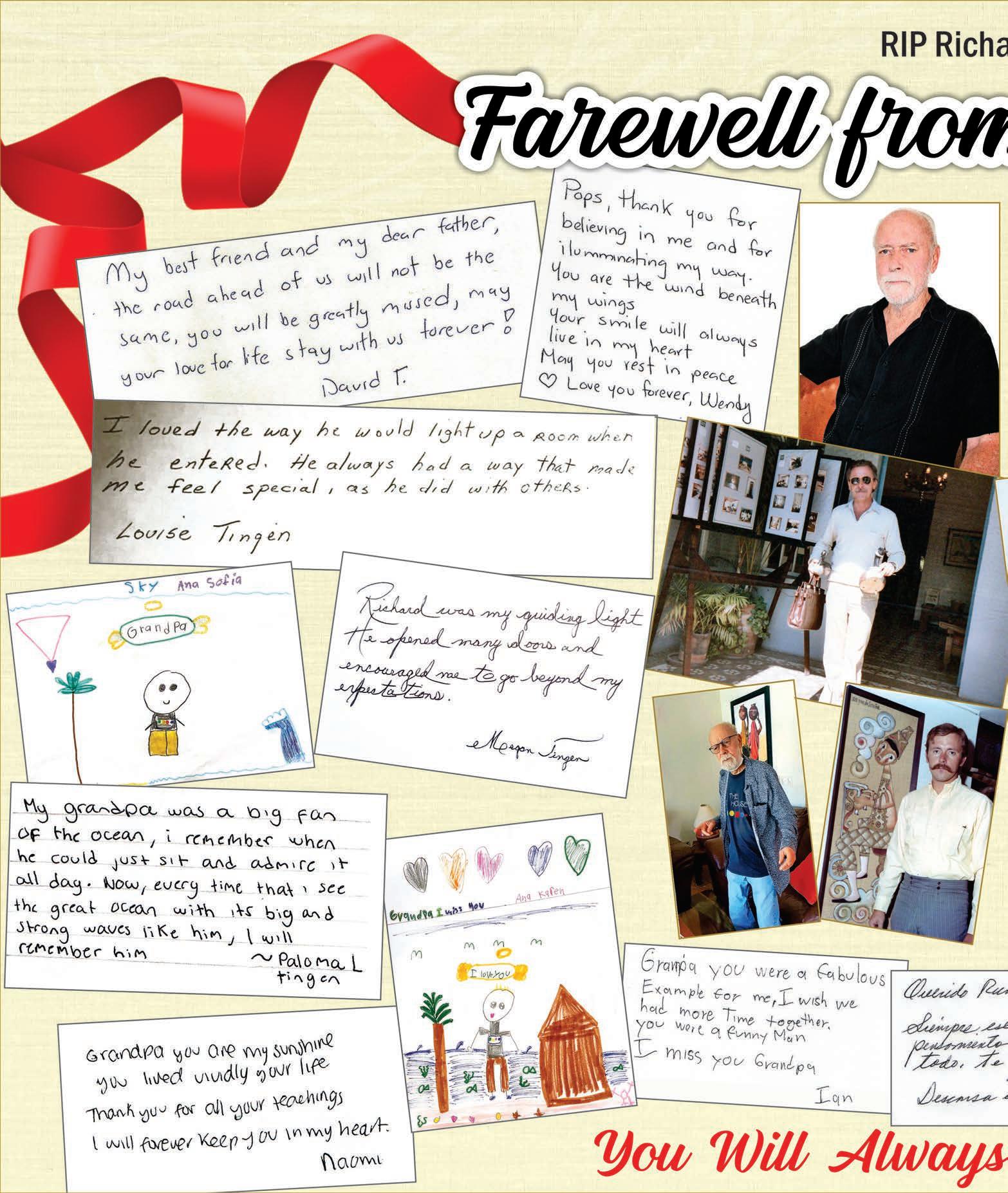
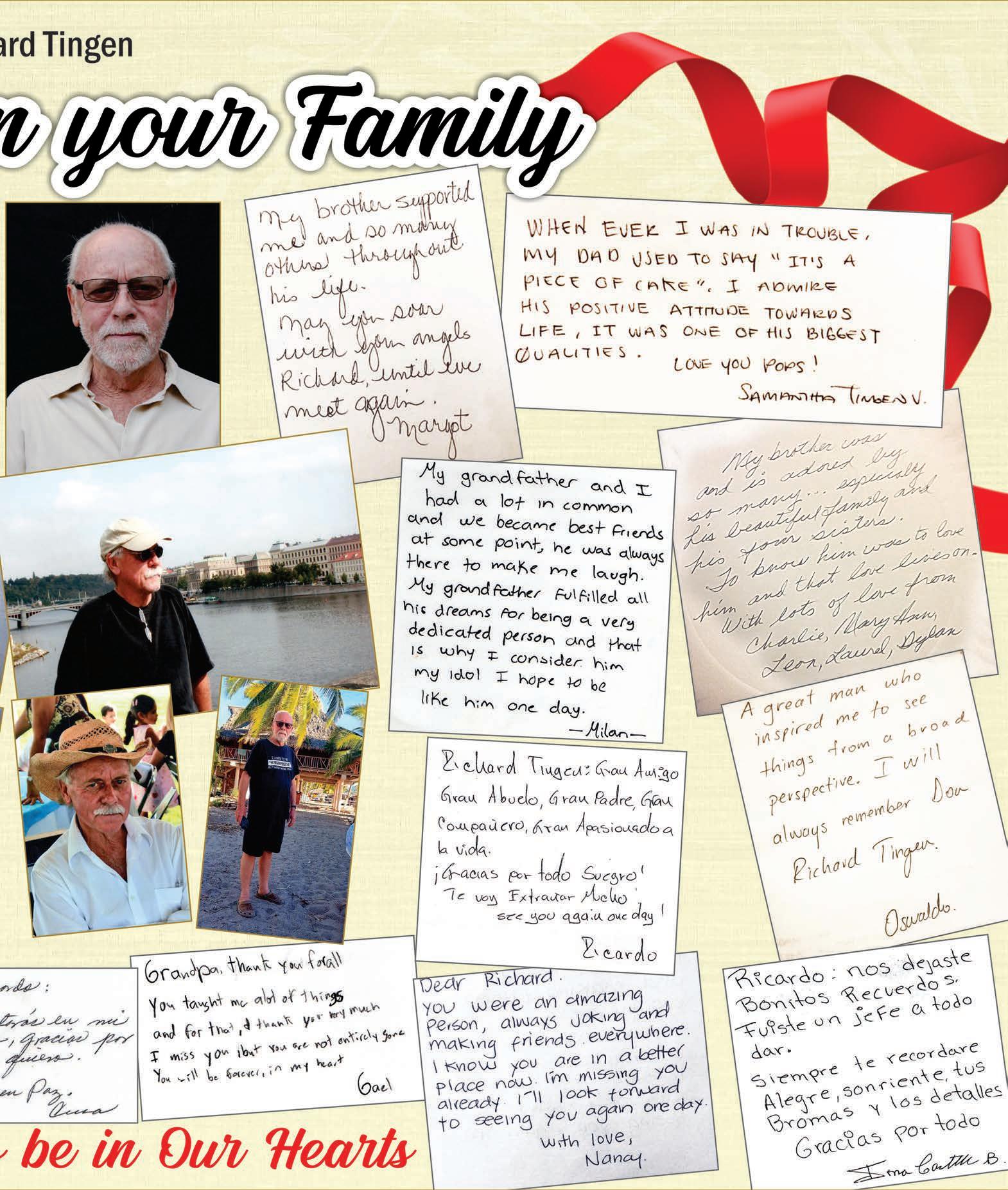


International Institute students on Mezcala Island performing a moonlight concert


International Institute students, and their program have benefitted from programs already offered in the greater Lakeside community. Many students take private lessons with CREM in Ajijic and the Casa de Cultura in Chapala. Michael Reason’s Lake Chapala Community Orchestra has been kind enough to receive the most talented strings players in several rehearsals, which has been a welcome opportunity for the students to learn from practicing musicians with decades of experience. LCCO’s concertmaster, Martha Murphy, even gave a free strings clinic, and Michael Reason came to the school to give a talk about power of music and its’ role in the events of 20th century history.
The last, pre-pandemic concert was in conjunction with the Yacht Club of Chapala, and it was absolutely magical. Luis Villaseñor Parra invited 15 students to take their instruments and music to Mezcala Island, in boats, to play a one-hour dinner concert, under the light of the full moon on the 11th of February 2020.
Not long after, Jalisco went into COVID lockdown, and rehearsals stopped for several months.
Now, post-pandemic, orchestra numbers have dropped to about 10 dedicated students, teachers and community members. We rehearse in Cristiania Park in Chapala on Saturdays at 1 PM; they had a Facebook Live concert in December, and we performed for a fundraiser led by Susan Larson, benefiting the cats at the Lake Chapala Society. They hope to have another Facebook live concert at the end of March.
Beginning strings’ classes start again on Saturday mornings at 9AM at the International Institute, C. Internacional 63 in Col. Brisas al Jaguey, in front of the Tecnológico de Chapala on the Libramiento to Guadalajara. Classes are taught by Mtra. Fátima Flores and Lily Ehlebracht, with two of their star strings’ players from high school acting as teaching assistants in order to comply with their community service graduation requirement.
Anyone can join, but attendees must RSVP for a space at 376 688 0004 (in order to comply with social distancing) and students must bring their own instruments and books.
Lakeside Living thanks Mtra. Lily Ehlebracht for her write-up, information, invitation and photos. CDB






By Margaret Van Every
They met in the US Postal Service in 1936, in St. Louis. She was a secretary/stenographer and he was a post office inspec-
tor. They loved their work and they loved each other, partly because of shared love for their employer. The post office was not just any workplace. Its inability to lay them off was getting them securely through the Great Depression, and for that Ted vowed to remain loyal to his employer for the remainder of his life, even though he had a law degree.
Ted, with his parents and seven siblings, had immigrated from a shtetl in Transylvania to Chicago when he was a small child. He quickly learned English, studied hard in school, and started helping support his family as a milkman’s assistant, delivering heavy bottles to topfloor apartments in the wee morning hours before school. His goal was to melt in the Great Melting Pot and reap the fruits of the Promised Land.
The Postal Service was an institution anyone would be proud to be part of. Predating the Declaration of Independence, it was the first federal law enforcement agency, founded in 1772 by Benjamin Franklin. It not only delivered the mail, but provided Ted a new set of Commandments after he had laid down the oppressive burden of his own religion. All employees swore to adopt the post office code of conduct so they would know how to behave on and off the job.
He also liked that his employer was the legislator and enforcer of public morality. If postal inspectors suspected the sender or recipient of mail of unlawful or deviant behavior, they could steam open an envelope and examine the contents, no warrant necessary. They could withhold leftist publications in order to do what was in the best interest of the individual and the nation. They could even decide what books were fit to be sent through the mail, barring filth like Tropic of Cancer and Lady Chatterley’s Lover, thus sparing the United States of America from the corruption of smut. If the Postal Service, in its wisdom, deemed a book to be sexually stimulating, it was empowered to send publishers to prison with six months to five years of hard labor for printing “obscene, lewd, and/or lascivious materials.” Lumped under these definitions was information pertaining to contraception and abortion. Postal inspectors were among the country’s original men of action, gun toters who risked danger for the public weal.
A post office inspector swore to uphold high moral standards. Unfortunately, to get the job Ted had to lie about his age on the application, perjuring himself—but only for the sake of consistency. When he was 15 he had told the first lie about his age in order to enlist in the US Cavalry. It gnawed at him every day that he had to maintain the lie all the way to retirement and cheat his employer out of two years of service. No one had ever checked the date of birth on his immigration documents because none was recorded.
Sally had her own reasons for loving the Postal Service. What drew her to her stenographer’s job there was that she worked for something she believed in, namely, writing letters and enabling people to stay in touch. She lavished her literary bent on letters to family and friends, written on a mahogany desk with a goldnib fountain pen. She was intrigued with stationery—its textures and tints and intertwined, illegible initials. She was sentimental about addressing an envelope with a flourish, daubing it with a seductive scent, and licking a stamp with an image matched to the interests of the recipient. Even the corner mailbox captured her fancy, the way you opened the chute and inserted your letter, your heart thumping as you abandoned it to the belly of the box—because sometimes you bared your feelings or wrote something of questionable taste, something you intuited you might regret. Yet once inside the box, it was irretrievable, no longer deemed your legal property. A uniformed employee would slip it into his sack, another would sort it, and yet another would deliver it. It took so many caring hands to process the mail.
A willowy brunette from near Austin, Texas, Sal was 36, eight years older than Ted’s real age but only 6 years older than his fabricated age, which was the only age that mattered anymore. People said she resembled Wallis Simpson, the glamorous, scandalous Duchess of Windsor, Continued on page 36







and Sal flaunted the resemblance, which included the now fashionable notoriety of being a double divorcée.
The couple eloped on New Year’s Day 1937 and decided to drive to Mexico City for a honeymoon as soon as they could pack their bags and settle affairs at home. It was the most romantic honeymoon Sal could imagine. Ted said they could justify such an extravagance because he could inspect post offices all the way from St. Louis to Laredo. Sal bought a gilt-edged leather-bound journal with the title “My Trip” stamped in gold. She would document everything on the honeymoon, including her secret-most thoughts. That’s what a diary is for, to serve as a confidant when there’s no one else to listen.
Sal Begins Her Diary
Our first night, January 4, Poplar Bluff, Missouri. Ted stopped in the PO, and what do you know, there was a notice from Ted’s boss that because he is now married, he will receive a $300 annual salary increase. Will I get a raise, too, because I’m married?
Jan. 5. I woke this morning to find that Ted was nowhere to be seen. A note informed me he had ventured off to visit post offices in neighboring towns. I didn’t mind staying in the room manicuring my nails, buffing my arms, writing letters, and reading the Poplar Bluff Gazette. A woman, after all, needs time to herself. It’s awkward to groom oneself with a man looking on, prying into your maintenance secrets.
Jan. 6. On to Blytheville, Arkansas, where we got a hotel right across the street from the post office. Together we wrote a 6-page report on the POs visited so far. Ted had brought along his Underwood and I took dictation and typed it all up. Might as well. Just married and nothing else to do in this little town.
Jan. 7. Destination Little Rock, driving through rain and sleet. First stop was you-know-where, where one of the inspectors invited us to his home for dinner. By day’s end, a blizzard had started
Jan. 8 in Ft. Smith, another warm welcome from the postmaster and his inspector, including another homecooked meal. Wives of postal inspectors beware! Short-notice guests come with the territory. Dear diary, does this sound like a honeymoon?
Morning of Jan. 9 we discover the postmaster paid our $2 hotel bill as a wedding gift. Such generosity. The post office is family wherever we go. The blizzard had made roads nearly impassable with snow so deep we weren’t sure where the road was. Nonetheless, we forged on to Dallas for just one night and then to Austin, my home turf.
I told Ted I didn’t care about any other accommodations but wanted a good hotel in Austin, where my childhood friend lives. But because the state legislature is convening, we had to stay in a “thirdrate” hotel. Nonetheless, because of certain people I know, we got invited to a hastily arranged cocktail party at Senator Parnell’s suite at the Driskill and were his dinner guests later that evening at the Stephen F. Austin Hotel.
On January 13, after breakfast with my girlfriend and the senator, we set out for San Antonio, passing through San Marcos where my family, the earliest settlers there, are buried. I yearned to visit their graves but Ted was so eager to get to Mexico, I didn’t insist. He left his ancestors buried in Europe and he can’t comprehend why anyone would visit graves anyway. We arrived in San Antonio around noon and checked into a decent hotel. That night we saw The Drunkard at the Diamond Horseshoe.
January 14, I put my foot down and insisted that Ted see the historic Alamo despite his disinterest. It was even more important to me than visiting the graves of my forebears. In strained silence I breathed in the sacredness of this shrine that is hallowed ground to all Texans, as Ted looked at his watch and chafed to hustle on.
We were soon on the streets of Laredo, where we checked into The Plaza Hotel. Ted went immediately to the post office and picked up both our paychecks. How coincidental! Postmaster Jackson, from St. Louis, had just passed through Laredo the day before en route home from Monterrey. Mild weather here.
Dear diary, this is not at all how I remember my first two honeymoons! I keep waiting for this one to get started. I guess it will begin tomorrow once we cross the border and leave all the post offices behind us.
To be continued in our March issue...

Margaret Van Every





September 21, 1929 - January 10, 2021
Our brother in Christ, Tod Johnson, entered eternal life on January 10, 2021. Please join us as we extend our deepest sympathy to all of his dear friends and family.
Born Raymond Arthur Johnson, Tod seemed to live a charmed life. As a youth, in Tulsa, Oklahoma, he studied theater and was “discovered” when he was 18 years old by a producer who gave him a starring role in an off-Broadway play. His roommate during this time was Montgomery Clift. Later, Tod moved to California to join the Pasadena Playhouse where he caught the eye of Ingrid Bergman, who cast him in her movie Joan of Arc and helped him garner a contract with Twentieth Century Fox.
A few years later, he left acting and pursued behind-the-camera endeavors, producing documentaries with his beloved partner, Ektor Carranza, and winning three Oscars.
Tod blessed Lakeside with his presence for several wonderful years. He shared many, many stories about his encounters with the glitterati of Hollywood—including occasions when he danced with Marilyn Monroe.
After Ektor’s passing, Tod’s health would not allow him to remain with us, so he moved, with another of Lakeside’s sparkling and enduring talents, Joyce Vath, to the Alabama coastal town of Fairhope.
In Fairhope, he had his own radio show for over five years, avidly campaigned for the town’s former mayor Tim Kant, worked on the annual Film Festival, the Fairhope Public Library’s Chocolate & Champagne Fantasy fundraiser, and organized the history records for the performing arts theater, Theatre 98. He also enjoyed the task of shining the silver at Emmy’s Thrift Store.
Tod’s funeral service was held January 20, 2021, in Fairhope, at his beloved St. James Episcopal Church.

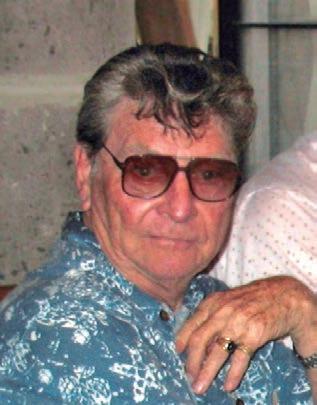





This is a regular feature column inspired stories that manifest “Mexican Grace.”
El Ojo is looking for more anecdotes that relate the many encounters, initiated by expats or locals, that exemplify the special forms of mutual giving and receiving that define the Mexican Grace that brought us to this unique paradise--and that keep us here.
Please email articles of up to 900 words, with a Title and your name at the top to both victoriaAschmidt@gmail.com and loretta.downs@gmail.com.
Photos are welcome.

THE QUEEN OF CLEAN
By Loretta Downs

In 1980 my work started to involve frequent travel and long hours so I engaged a cleaning lady.
First, it was once a month then more frequently as my time diminished and my income increased.
It didn’t take long for me to love coming home on the day she had stormed through the apartment. Oh, the smell of lemon Pledge, the sight of a dustless home, the order that was regained, the pictures on the wall slightly tilted to let me know they, too, were touched with her soft rag, were the reward to paying another to enter my domain and do the hard work of cleaning it.
Even though I haven’t cleaned my own home since 1984, I am never totally comfortable, maybe even feeling a little guilty, having another woman clean my house. To ease my discomfort, I try not to be home when she is working because I know I could do it myself if I were more organized and prioritized my time differently. I pay dearly to go to a gym instead of exercising with a broom or a mop.
Some of my discomfort is surely connected to my mother. She was obsessive about cleaning. Not the kind of obsession that needs therapy (well, maybe), rather the kind of obsession that could not live with a bit of dirt near her. We had an old house with a basement where she washed, hung (outside in the summer), ironed our clothes, and cooked on her original 1935 stove to not make a mess in the upstairs kitchen. You could lick the cement floor it was so clean.
My mother was born in 1912 to Italian immigrants who had found their way from Ellis Island to a small coal mining town in southern Illinois. They were poor even before her father died in the 1918 flu epidemic (yes, I get vaccinated), but after that her mother worked desperately to keep her five children together.
At the age of 12, she was sent to St. Louis, 90 miles away, to be a live-in servant in the home of a couple with two small children. She never said much about that experience, though she smiled when she talked about the “nice family” and sending her $50-amonth salary to her mother. After one year the family sent her home to finish grade school. Cleaning is in my blood. So is respect for the cleaners.
When I bought a home five years ago, a friend recommended a young woman starting out in the cleaning profession. I didn’t have the patience—or the emotional vigor—to train her and she didn’t like the work, or maybe me. We parted. Then Josefina came into my life, improving it in untold ways.
The house has more windows and doors than walls, and they are often open to let in warm air and birdsongs, and also dust. Lots of dust. I discovered just how much dust during my first two-week quarantine, in March, when I returned from the States and I paid Josefina to stay home so she wouldn’t lose income.
I was willing to wash my dishes and wipe the mess on the counters, but I could not get in the mood to move the dust that I watched accumulate until I could quite easily have written my grocery list on the coffee table. About day ten I drank enough coffee to take a few swipes at the surfaces that were beginning to support plant life. I even took Josefina’s mop in my hands, wondered what products she uses to wash the floors, looked around in the (her) cleaning supply cupboard, stood dazed a moment, and put the mop back.
By the end of my quarantine I had cleared narrow paths from room to room with my slippered feet and followed Erma Bombeck’s advice to “just lower the lights and put flowers in vases, then no one will notice the dust.”
Just like my mother, Josefina simply abhors dust. She walked in shaking her head, “Polvo! Hay mucho polvo!” Dust! There is so much dust! I gave her an air hug and left, knowing when I returned five hours later there would not be one speck of dust in my house. Even if there were, I wouldn’t see it. I call her La Reina de la Limpieza, the Queen of Clean.
Once in a casual conversation I mentioned to someone that I was giving her a raise. Without even asking from what to what, they said, “Don’t do that or I’ll have to give mine a raise.” Really? Based on casual research, the pay range for cleaning services in Lakeside is 50 to 100 pesos per hour. In the US the going rate is $25 an hour, and finding a good, reliable, trustworthy cleaner is not easy.
Josefina, her mother, and some of her many sisters have always cleaned houses to contribute to the family’s income, resulting in an educated and hard-working younger generation in the Lopez family, just like in my family. She’s only ten years younger than I am, and I hope she remains strong much, much longer. I need her not only to move my sofa and mop my floors, but because she reminds me where I came from. That reminder makes me beyond grateful that I don’t have to clean my house or anyone else’s house like my mother did.




Loretta Downs




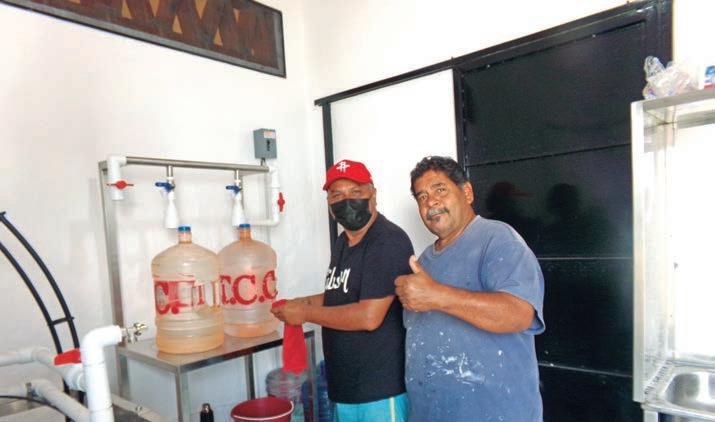


By Moonyeen King
President of the Board for Tepehua moonie1935@yahoo.com
The Tepehua Team wishes the world Health and Peace this 2021, as we spin into the New Year with great
expectations. This Author would like to embrace the oncoming year fiercely and demand change, but we must have patience, change will come.
Last year was not all doom and gloom, we had high moments and were able to achieve things using a different tactic that seemed to work. One of the highs was the introduction of the potable water unit that was built at the Tepehua Center with the help of Rotary. Despairing over the deaths from water diseases caused by polluted wells, we took matters into our hands. The local barrios could not afford the bottled water prices of this area, so our Water Unit was built on the promise of a controlled price, so that affordable water was available to all barrios and villages Lakeside, and businesses, restaurants, etc, which would like a better price for their water and at the same time, help the Community Center remain sustainable. We are licensed to sell by the Health department. The Distribution Center is open for visits and sales every Friday and Saturday morning from 10am until Noon, or call Adam at 332-627-1274 for English and Carlos at 333-004-7849 for Spanish. Delivery is possible from Ajijic going East only. Or order your needs at Tepehua Treasures store in Riberas every Wednesday from Noon until 3pm where your order can be delivered for pick-up. The cost per garrafone (5 gallon bottle) is 15 pesos. People get affordable water and a village gets support. How’s that for sharing the wealth?
Sadly, the education for younger kids and those that have no computer resources was put on hold through the year. To replace that, the Tepehua Education unit opened English Classes which have become popular. English language is essential to the service Industries which create a stronger middle-class for the Barrios Lakeside. Although the service industry was forced to close down partly, this service will always be needed in tourist towns such as Chapala/Ajijic. The middle-class in Mexico is getting stronger because education is reaching the masses, a sure indication the future is brighter for so many. The people are demanding and getting their rights, and although the pandemic forced many to their knees, change is inevitable and still happening. We can never be the same but we can be better.
A future project will be to have a public toilet built on the edge of the barrio in Tepehua so that ALL people have access to a toilet rather than to defecate on the land, causing so much of a health risk to all people especially in the rainy season, where human and animal waste eventually end up in the wells through rainwater runoff. Communal Baños will give work to a few people once built, to hand out the toilet paper and keep the toilets up to the local Health Department’s standards.
We will never eradicate poverty, but we can help to bring a little dignity to our less fortunate neighbors, and make the world a better place. The Tepehua Community Center vows this year to keep our free medical consultations open, help for education available, potable water and pharmaceuticals affordable. The support of the public for the Tepehua Treasures Bazaar in Riberas was for Tepehua Center a life line. We managed many things and kept services to the people open; it could have been so much worse. We are not through this by any means. Don’t let down your self protection or that of your brothers not even for a second. Although the vaccine gives hope, it will be awhile before this pandemic loses its grip on the world.
Look forward with hope, but live cautiously. You can make life as you want it, happiness is a state of mind.
For the Tepehua Team!
Moonie











